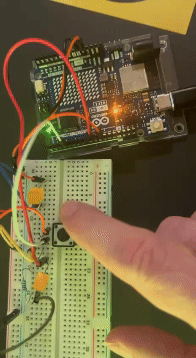Assignment 1 #
demonstration #

Code with comments (debouncing approach): #
int ledPin1 = 10;
int ledPin2 = 9;
int buttonPin = 3;
int buttonRead;
int buttonState; // the current reading from the input pin
int lastButtonState = LOW; // the previous reading from the input pin
int ledCount = 0;
/* debouncing is done as in the tutorial: https://docs.arduino.cc/built-in-examples/digital/Debounce/ */
/* unsigned for handling large numbers, since using milliseconds */
unsigned long lastTimer = 0; // the last time the button was pressed/released
unsigned long debounceDelay = 50; // the debounce time;
void setup() {
pinMode(ledPin1, OUTPUT);
pinMode(ledPin2, OUTPUT);
pinMode(buttonPin, INPUT);
Serial.begin(9600);
}
void loop() {
buttonRead = digitalRead(buttonPin);
Serial.println(ledCount);
//listening the button state
if (buttonRead != lastButtonState) {
//starting to track the time after the button was pressed or released
lastTimer = millis();
}
if ((millis() - lastTimer) > debounceDelay) { // If sufficient time has passed since last bttn state change
if (buttonRead != buttonState) { //and button state changed again
buttonState = buttonRead;
if (buttonState == HIGH) { //updating the count value (0-2)
ledCount++;
if (ledCount==3)
ledCount=0;
}}}
if (ledCount == 0) { //writing the led states depending on the current count for each cycle of the loop
digitalWrite(ledPin1, LOW);
digitalWrite(ledPin2, LOW);
} else if (ledCount==1)
{
digitalWrite(ledPin1, HIGH);
digitalWrite(ledPin2, LOW);
} else {
digitalWrite(ledPin1, HIGH);
digitalWrite(ledPin2, HIGH);
}
lastButtonState = buttonRead;
}